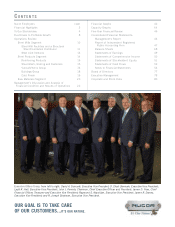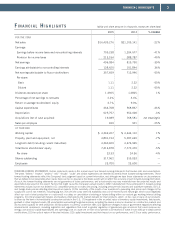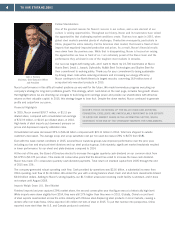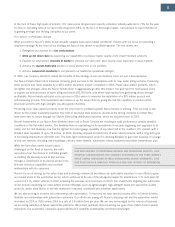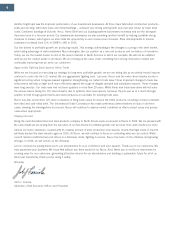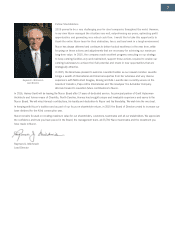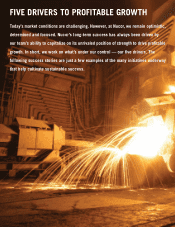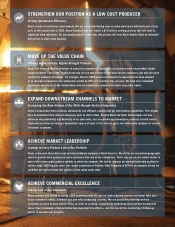Nucor 2015 Annual Report Download - page 14
Download and view the complete annual report
Please find page 14 of the 2015 Nucor annual report below. You can navigate through the pages in the report by either clicking on the pages listed below, or by using the keyword search tool below to find specific information within the annual report.
12
Skyline also manufactures a complete line of geostructural foundation solutions, including threaded bar, micropile, strand anchors and
hollow bar. It also processes and fabricates spiralweld pipe piling, rolled and welded pipe piling, cold-formed sheet piling and threaded bar.
During the fourth quarter of 2014, Nucor-Yamato completed a $115 million strategic investment to expand the plant’s hot-rolled
sheet piling production capabilities. The initial output was sold to Skyline for a construction project and the new products have
achieved success in the marketplace during 2015. The new piling sections are wider, lighter and stronger, covering more area
at a lower installed cost. These new piling sections are expected to grow our structural market share profitably at this mill.
Furthermore, during the second half of 2016, Nucor-Yamato will begin commissioning its $75 million quench and self-tempering
project. This strategic investment will position Nucor-Yamato as the leading North American producer of high strength, low-alloy
beams. Common applications for the high strength, low-alloy beams include gravity columns for high-rise buildings, long-span
trusses for stadiums and convention centers, and for all projects where seismic design is a critical factor.
PLATE MILLS
Nucor operates two plate mills, one in North Carolina and one in Alabama. Our mills produce plate for manufacturers of barges,
bridges, heavy equipment, rail cars, refinery tanks, ships, wind towers and other items. Our products are further used in the pipe
and tube, pressure vessel, transportation and construction industries. The current annual production capacity of our two plate mills
is approximately 2,900,000 tons.
Nucor has recently executed on a strategy to greatly expand our plate product capabilities and offerings by constructing a
125,000-ton heat treating facility and a 120,000-ton normalizing line at the plate mill in North Carolina. Collectively, these key
investments have strategically positioned the North Carolina mill to significantly increase shipments and to capture a growing
share of higher value-added plate products that are less exposed to import competition.
STEEL MILL PRODUCTION OPERATIONS
Nucor’s steel mills are among the most modern and efficient mills in the world. Recycled steel scrap and other metallics are melted
in electric arc furnaces and poured into continuous casting systems. Highly sophisticated rolling mills convert the billets, blooms
and slabs into rebar, angles, rounds, channels, flats, sheet, beams, plate and other products.
Steel production decreased 9% from 21,135,000 tons in 2014 to 19,294,000 tons in 2015. The annual production capacity has
grown from 120,000 tons in 1970 to a present total of nearly 29,000,000 tons.
Scrap and scrap substitutes are the most significant element in the total cost of steel production. The average cost of scrap and scrap
substitutes used decreased 29% from $381 per gross ton in 2014 to $270 per gross ton in 2015. Depending on the market conditions
at the time, a raw material surcharge or variable steel pricing mechanism may be implemented to assist Nucor in maintaining operating
margins and in meeting our customer commitments during periods of rapidly escalating scrap and scrap substitute costs.
Electricity and natural gas usage are significant costs to Nucor. Total energy costs decreased approximately $3 per ton from 2014
to 2015, primarily due to lower unit costs for natural gas and electricity. Because of the efficiency of Nucor steel mills, the 2015
energy costs were approximately 6% of the net sales dollar.
The operations in the rolling mills are highly automated, resulting in employment costs of 10% of the net sales dollar in 2015.
Employee turnover in Nucor mills is extremely low. All employees have a significant part of their compensation based on their
productivity. Production employees work under group incentives that provide increased earnings for increased production. This
additional incentive compensation is paid weekly. Additionally, because we use electric arc furnaces to produce our steel, we can
easily vary our production levels to match short-term changes in demand, unlike our integrated competitors. Taking advantage of
this highly variable, low-cost structure has enabled Nucor to better control our costs during weak market conditions.
STEEL MARKETS AND MARKETING
Approximately 86% of the steel shipments in 2015 were to outside customers, and the balance was primarily used internally by the steel
products segment. Steel shipments to outside customers decreased 9% from 18,681,000 tons in 2014 to 17,006,000 tons in 2015.
Nucor’s operations include several international trading and distribution companies that buy and sell steel primarily manufactured
by the Company and other steel producers.
Our steel mill customers are mainly manufacturers, steel service centers and fabricators. The sheet mills continue to build long-term
relationships with value-appreciative customers. We enter 2016 with approximately 50% of our estimated sheet mill volume committed
to contract customers. Contract terms are typically less than 12 months in length with various renewal dates. These contracts are
generally non-cancelable agreements with a pricing formula that varies based on the current market-based indices at or near the
approximate time of shipment.
Global overcapacity has led to dramatic increases of imported steel into the United States in recent years. Foreign imports of
finished and semi-finished steel in 2015 accounted for approximately 34% of the U.S. steel market, despite significant unused,
cost-competitive domestic capacity.


